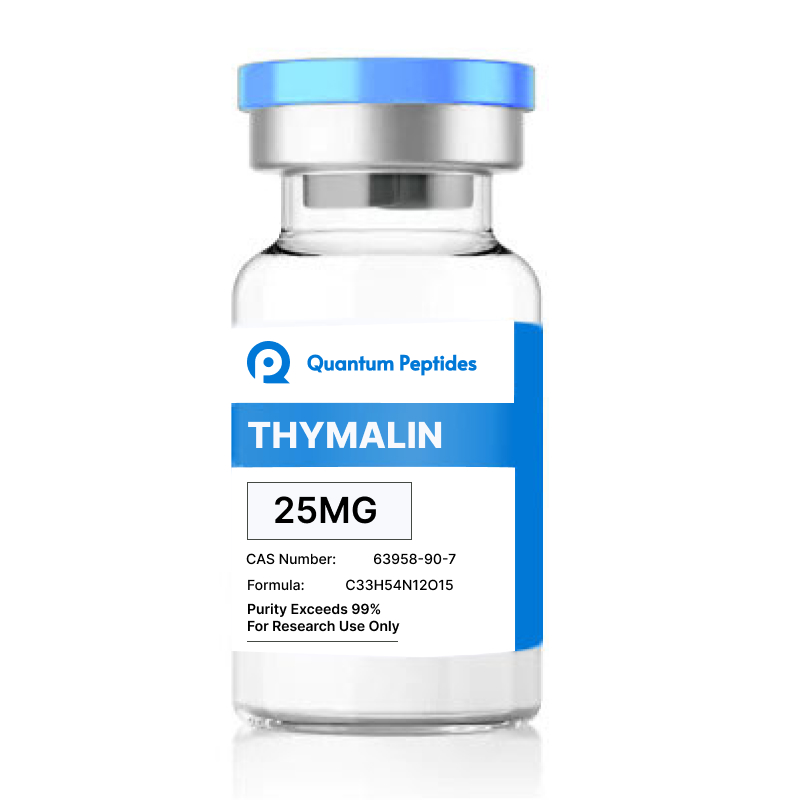Thymalin (25mg)
$129.00
Thymalin, a synthetic analogue of Thymulin, is implicated in modulating inflammatory responses and alleviating pain. Studies indicate its potential in enhancing immune function, addressing cardiovascular issues, and regulating circadian rhythms, making it a subject of interest in research exploring aging-related implications and life extension in murine models.
Size: 25mg
Contents: Thymalin (25mg)
Form: Lyophilized powder
Purity: >99%
SKU: P-THYMALIN-25
Free Shipping on $200+ orders
Thymalin Peptide and Immunomodulation
Thymalin, extracted from the thymus gland, is identified as a polypeptide that researchers propose may play a crucial role in immune function regulation. Scientific investigations have indicated that Thymalin is predominantly present in the young epidermal cells of the thymus gland. As individuals age, the levels of Thymalin are observed to decline, leading to a gradual thinning out and non-uniform distribution within the glandular structure.
The initial discovery of thymic peptides like Thymalin involved their isolation from the thymus gland through a gentle acid extraction procedure. Subsequent investigations into isolation unveiled the potential immunomodulatory molecule contained in Thymalin, identified as the dipeptide (L-Glu-L-Trp). This dipeptide within the Thymalin structure is subject to research, suggesting its potential involvement in the peptide’s mechanism.
Although Thymalin and Thymulin both belong to the category of natural thymic factors, researchers propose distinct modes of action for each. Thymalin, identified as a polypeptide, is believed to play a role in regulating thymic functions at optimal levels. On the other hand, Thymulin is considered a zinc-dependent nonapeptide hormone with the potential to enhance thymic functions, particularly in combatting T-cell suppression. The differences in their compositions and functionalities highlight the diversity within the realm of thymic factors.
Overview
Research efforts were dedicated to unraveling the mechanisms of action in various thymic peptides, encompassing both natural and synthetic counterparts. The investigated compounds included Thymalin, representing the natural polypeptide, Thymogen, characterized as a synthetic peptide, and Vilon, derived from the latter as a dipeptide. This comprehensive study aimed to discern the unique attributes and potential applications of these diverse thymic peptides.
The research findings indicated that the entire spectrum of peptides within the thymic family potentially operates by stimulating thymic functions, involving processes such as T-cell differentiation, nucleotide alterations, cytokine cell induction, and lymphocyte secretion. Another noteworthy conjecture arising from the study was that Thymalin, as a naturally occurring peptide, might activate antioxidant responses, a facet seemingly absent in the two synthetic analogues according to the researchers’ observations.
Exploration and Clinical Investigations
Thymalin and Oncogenicity Investigation
In this research endeavor, a cohort of 76 female rats aged 5 months was assembled to delve into the potential impact of Thymalin on tumor development and subsequent survival rates. The subjects were bifurcated into two factions, with 32 rats administered saline and the remaining counterparts receiving Thymalin. The compounds were introduced five times a week over the span of one year, during which comprehensive monitoring was conducted to track mortality rates and tumor progression. The study findings revealed that the average lifespan in the control group was 949 days, while the Thymalin group exhibited an extended average lifespan of 1048 days. The “aging rate” displayed a notable decrease from 0.0071 days in the control group to 0.0041 days in the Thymalin group. Moreover, the incidence of tumors purportedly diminished by 1.5 times in the Thymalin-administered group compared to the control group.
Thymalin and Antiviral Activity
In this scientific inquiry, a cohort of 50 female subjects with HHV-1 and a control group underwent scrutiny in a clinical study. The subjects were exposed to the peptide for a duration of 2 months, and peripheral blood cell tissues were collected for cytokine level analysis before and after the study. The findings indicated that, in comparison to the control group, the HHV-1 group experienced a higher elevation in cytokine levels. Specifically, the levels of CD4+ and CD8+ cytokines were reportedly increased in the HHV-1 group compared to the control. Furthermore, researchers observed no reactivation of the HHV-1 virus in the test group after the two-month period.
Thymalin and Autoimmune Thyroiditis
In this comprehensive clinical investigation, a total of 104 participants with mild Autoimmune Thyroiditis (AIT) were enlisted to assess the impact of Thymalin on medium weight molecular peptides and lipid oxidation rates. The primary objective was to evaluate the potential of Thymalin in addressing AIT. The subjects were categorized into five groups, each receiving different interventions, including an external compound, a combination of Thymalin and an external compound, or the peptide alone. Subsequent to the study, the results indicated that the combination of compounds and Thymalin demonstrated a notable alleviation of AIT symptoms among the participants.
Thymalin and Immunodeficiency
In this research inquiry, individuals with immunodeficiency disorders were included to explore the effects of Thymalin in conjunction with immune correction actions. The study involved the administration of Thymalin alongside plasmapheresis, a non-specific immune correction approach. In contrast to the exclusive impact of standard therapeutic agents, this combined intervention demonstrated a purported enhancement in physiological functionality within a brief timeframe.
Thymalin and Longevity
In this investigation, the potential impact of Thymalin, a thymic peptide, and Epithalamin, a pineal peptide, on the longevity of 266 mature participants was scrutinized over a span of 6 to 8 years. The participants received these peptides for the initial 2 to 3 years, followed by regular monitoring. The subjects were categorized into distinct groups, each receiving Thymalin, Epithalamin, a combination of both peptides, or varying concentrations of the peptides. Administered annually for 6 years, the peptides appeared to contribute to significant enhancements in fundamental bodily functions, encompassing cardiovascular, neurological, and immunological aspects. Furthermore, the peptides were hypothesized to influence metabolic and hemostatic activities, suggesting a potential link to increased longevity.
Thymalin peptide is exclusively accessible for scientific research and laboratory applications. Before placing an order, it is essential to carefully review and comply with our Terms and Conditions. We emphasize the importance of adhering to ethical and regulatory guidelines in the utilization of Thymalin for research purposes.


Reviews
There are no reviews yet.